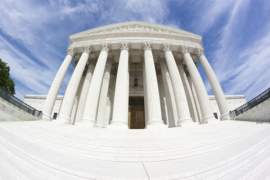
Printz v. United States

The Background of Printz v. United States:
Printz v. United States was a landmark Supreme Court Case, which established the unconstitutionality of certain interim provisions latent in the Brady Handgun Violence Prevention Act.
Printz v. United States, revolved around the Gun Control Act of 1968, which established an exacting Federal scheme that ultimately governed the distribution of firearms in the United States. The Gun Control Act of 1968 prohibited the ownership of firearms by certain broad categories of individuals who were thought to pose a threat to public safety. The individuals latent in the Gun Control Act of 1968 were such people as fugitives from justice, convicted felons, unlawful aliens and many others.
In 1993, the United States Congress amended the Gun Control Act of 1968 by enacting the Brady Handgun Violence Protection Act. This piece of legislation required the Attorney General to establish a national background check system to prevent the sale of firearms to the aforementioned persons.
Printz v. United States Trial:
Jay Printz and Richard Mack (the CLEOs for Ravalli County, Montana and Graham County, Arizona respectively) filed separate actions that ultimately challenged the constitutionality of the Brady Act’s interim provisions.
In each case, the District Court system held that the provisions requiring the CLEOs to perform background checks was in fact unconstitutional, but also concluded, that the provision was severable from the remainder of the Act. This ruling, in the lower courts, placed a voluntary background check in place. A panel of the Court of Appeals for the Ninth Circuit then reversed this ruling, stating that none of the Brady Act’s provisions were unconstitutional.
The Printz v. United States, was then heard by the United States Supreme Court, who ruled that the Brady Handgun Violence Prevention Act’s interim provision--which commands that the chief law enforcement officer of each jurisdiction conduct background checks—was unconstitutional.
The Case Profile of Printz v. United States
The following is a case profile of the legal trial eponymously titled ‘Printz v. United States’:
Date of the Trial: December 3, 1996
Legal Classification: Constitutional Law
Date of the Delivery of the Verdict: June 27, 1997
Legal Venue of Printz v. United States: United States Supreme Court via the United States Court of Appeals for the Ninth Circuit
Judicial Officer Responsible for Ruling: Chief Justice William Rehnquist
NEXT: Regents of the University of California v. Bakke




















